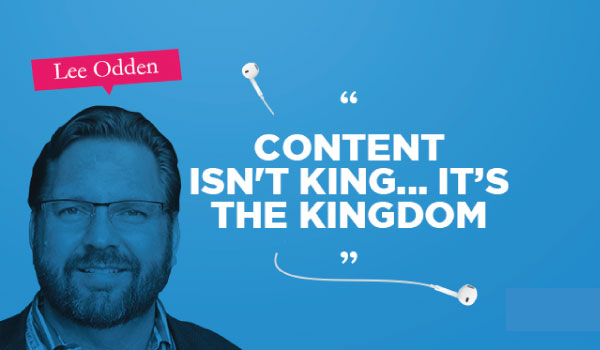
“We make decisions emotionally and then justify them logically.” That statement is one of those unattributed, unattributable quotes that pops up everywhere from neuroscience to content marketing. There’s probably a poster of it you can hang on your office door. Probably with a picture of an adorable kitten, or perhaps a whale jumping over a rainbow.
But behind the cliché is an undeniable truth for marketers: Emotions matter. Emotional engagement is crucial for any kind of marketing, from presenting at a conference to writing a long-form blog post. That kind of engagement requires more than just a passing understanding of your audience. It requires genuine empathy.
As CEO of TopRank Marketing, Lee Odden has spent over a decade learning how to foster exceptional empathy with an audience. Lee recently sat down with Ph Creative CEO Bryan Adams to talk about creating and amplifying emotionally engaging content. You can listen to the interview on Bryan’s Getting Goosebumps: The Power of Storytelling podcast:
Read on for the takeaways from Bryan and Lee’s discussion.
Public Speaking Is about More than the People in the Room
When you give a presentation, Lee says, keep two goals in mind:
- Make a connection with the people in the room
- Optimize your presentation to connect with the thousands of people not in the room.
If you can inspire the audience in the room, they will share your message with their network, which grows your audience exponentially.
Keep that larger, hidden audience in mind when you create your presentation assets as well; make your visuals worth sharing and make them readily available after the presentation.
Marketing’s Biggest Obstacle Is Often the Status Quo
Many buyer decisions are not choosing between multiple vendors, but choosing to take no action at all. Fear of the unknown and fear of change can make buyers wonder if the status quo is really so dire that it needs a shakeup.
It’s up to the marketer to challenge the status quo on an intellectual and an emotional level, Lee says. Just citing the measurable benefits of making a change might not be enough to spur action. Instead, it’s important to tell two stories: the story of what the buyer can accomplish with your solution—what their life will look like if they make a change—and the story of what will happen if they don’t.
Make clear not only what they can gain from your solution, but what they lose sticking with the status quo. A combination of inspirational success stories and cautionary tales can be a powerful emotional motivator.
Find Your Ideal Audience and Really Learn Them
Lee suggests investing time in identifying your best possible buyer. That means going beyond just finding a target audience and really zeroing in on those who would be best to work with. Turn your marketing magnifying glass around and try telling yourself the story of your ideal buyer.
Once you nail down the specific buyers to pursue, go deep. According to Lee, too often brands focus on what they think the market needs to know about their brand, disregarding their audience’s deeply-felt needs. So take time to learn their goals, their pain points, the questions they ask. Let their needs drive your creation of best-answer content. It’s the only way to engage on an emotional level with any authenticity.
Let Your Audience Research, Not Trends, Drive Your Content
Marketers have a tendency to focus on the newest magic bullet that promises to work for any audience. While some of these new tactics can be effective, not every tactic is right for every audience. Lee cautions against pursuing a particular channel just because it’s the next big thing.
For example, video content is a great way to make an emotional connection with your buyer—if your buyer is interested in watching videos from your brand. If they prefer blog posts and you’re sending them YouTube playlists, you may fail to engage completely.
The most important thing is to do that audience research that tells you where your audience is, what they want to hear, how they search for information, and how they consume content.
Great SEO Is Transparent
Another advantage of creating content based on smart research is that it has SEO baked into it. Think of keywords as more than little phrases with numbers after them that indicate search volume. Keywords signify intent, Lee says. They provide insight into the mind of the buyer, letting you know exactly what language will resonate with them.
Smart research enables you to create content that speaks your target audience’s search language. Which gives you good SEO without compromising readability or sounding stiff.
Co-Create Content to Preload Promotion
The old marketing model is to create content, then create a plan to amplify it. Lee recommends co-creating content to have a base level of amplification built in. That doesn’t mean just including influencers in your content, though. You can co-create with your internal staff, all of whom have their own networks. Or existing customers that have already invested in your brand.
Or, for a more radical approach, you can co-create content with potential customers. It’s a strategy that has worked well for us in the past, and we continue to pursue this kind of creative partnership. Essentially, you create an emotional bond by co-creating something awesome. You get the amplification benefits of influencer marketing, plus you establish a relationship you can nurture to turn a potential client into a paying customer.
Empathy Begins with Knowledge
All of the ways Lee and our team engage an audience emotionally start with a deep understanding of that audience. Without genuinely taking an interest in their wants and needs, we wouldn’t be able to empathize with them in a real and affecting way. Once you have the kind of empathy that comes with deep understanding, it will inform every part of your content strategy, from SEO to amplification.
Need help creating content that moves your audience TopRank Marketing can help!
Header image via Ph.Creative.


